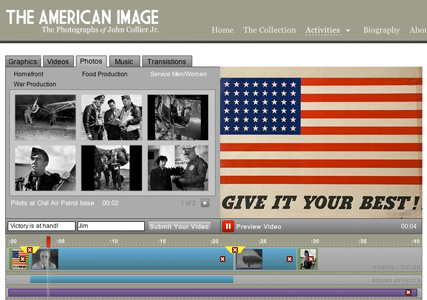Background
The American Image: The Photographs of John Collier Jr. was developed with a grant from the National Endowment for the Humanities. The Maxwell Museum of Anthropology and College of Education’s Technology & Education Center (TEC) at the University of New Mexico collaborated with Ideum to develop this interactive website.
Most of the photographs that appear on this site were taken for the Farm Security Administration/Office of War Information (FSA/OWI) during the war years of the 1940s. The FSA/OWI hired John Collier Jr. to document day-to-day life in America with a focus on issues of civil defense and public morale. The images that appear in the collection were taken from across the country, from New Mexico to Maine and provide a snapshot of ordinary life in those extraordinary times.
Lesson Plans
Activities offered on this website guide users through an in-depth examination of visual media. Active Looking encourages the process of close examination of photographs. Users will become more proficient at analyzing and decoding images for information – who might have created them, within what context, using what tools and for what purpose. The Shooting Script explores how an image may be categorized with regards to its subject matter and how our definitions and understanding of these subjects can change over time. The Propaganda Filmmaker brings it all together by allowing users to combine photographs, text, audio and video to create their own video mashup. Our goal is that these activities will build and hone observation skills that can then be used on visual images everywhere, in print and on screen.
The Maxwell Museum of Anthropology
The Maxwell Museum was founded in 1932 as the Museum of Anthropology of the University of New Mexico, becoming the first public museum in Albuquerque. In 1972 it was renamed the Maxwell Museum of Anthropology in honor of philanthropists Dorothy and Gilbert Maxwell, whose donation of funds made possible a major expansion of the museum that same year. With its associated research institutes – the Office of Contract Archaeology, the Alfonso Ortiz Center for Intercultural Studies, and the Maxwell Center for Anthropological Research – the museum represents a comprehensive center for cultural studies and public education.
Reflecting a broad mission that encompasses the entire history of humankind, the Maxwell Museum's collections are worldwide in scope, with extensive holdings from throughout North, South, and Central America, Africa, Asia, Australia and the Pacific Islands. With its primary emphasis on the Southwest, the Maxwell is world-renowned for its holdings from this region. The Maxwell offers to visitors an opportunity to experience the richness of human lifeways in all their diverse expressions, providing a setting for both education and enjoyment unique in our state.
Technology and Education Center
The College of Education's Technology & Education Center (TEC) was established to facilitate the integration of computer technologies into educators' instructional activities, the TEC inaugurated its services and activities in 2000. The center provides computer facilities and services to students, faculty and staff of the College of Education as well as associated educational communities. The TEC manages and maintains several computer labs available to faculty and students; additionally, the TEC assists faculty members in learning and modeling hardware, software and peripherals for instructional activities. Finally, in collaboration with outside organizations and funding sources, the TEC participates in a series of projects that explore the use and impact of multimedia technologies in education.
Use of Technology
The photographs that appear in The Collection and within The Shooting Script activity are drawn directly from John Collier Jr.’s photos on the Flickr website. Hundreds of archival quality photographs were posted to Flickr for this project. The American Image site takes advantage of Flickr’s API to bring in these photographs. These “mashups” were developed in Adobe Flash.
Our initial exploration of Flash and Flickr mashups brought us in contact with Doug Marttila who was kind enough to share code from his Findr application. In the end, we built something from scratch, however seeing Doug’s code helped speed up our process greatly.
Having the collection on the Flickr site has helped bring John Collier Jr.’s work to new audiences and communities. We hope that conversations will continue to develop as the millions of Flickr users discover his wonderful photographs.
The Propaganda Filmmaker is another type of mashup, a way for visitors to creatively interact with film clips, graphics, and photographs produced during the 1940s to support the US effort in World War Two. Beyond John Collier Jr.’s photographs, sources for this piece came primarily from the Internet Archive Movie Archive and the World War II Poster Collection from the Northwestern University Library.
We look forward to seeing what visitors to the site create with this experimental application.
Credits
Catherine Baudoin, Curator, Maxwell Museum Photographic Collections Content and curriculum development by Beth Maloney, Education Specialist Design, programming, and development by Ideum: Jim Spadaccini, Kemper Barkhurst, Jonathan Lee, and James Kassemi




